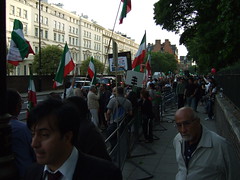 Image by jaimelondonboy via Flickr
Image by jaimelondonboy via FlickrBy Alasdair Henderson
BA (Demonstrators in Britain – risk on return) Iran CG [2011] UKUT 36 (IAC) – read judgment – and SA (Iranian Arabs-no general risk) Iran CG [2011] UKUT 41(IAC) – read judgment.
The Upper Tribunal (Immigration and Asylum Chamber) last week allowed two asylum appeals by Iranian political activists, and laid down guidance on the factors the Home Office and immigration tribunals should take into account when deciding asylum applications and appeals based on political activities here in the UK.
In the midst of all the excitement over the events in Tunisia and Egypt, it is important to remember that most countries in the wider Middle East are still under the control of authoritarian regimes which give scant regard to basic human rights. In particular, the success of the recent protests in removing Presidents Ben Ali and Mubarak from office are a reminder of the very similar, but unsuccessful, protests in Iran following the re-election of President Ahmadinejad in June 2009. The Iranian regime brutally suppressed the protesters in 2009, and there has been a crack-down on opposition activists since. The same reaction by the regime has been evident at renewed protests yesterday and today. The Upper Tribunal had to consider the ongoing situation in Iran in two recent decisions.
The longer and more generally applicable judgment is that of Cranston J in BA (Demonstrators in Britain – risk on return) Iran. The applicant was an Iranian student in the UK who did not have much of a history of political activism in Iran, but who took part in protests outside the Iranian Embassy in London in June and July 2009. His presence at these protests was recorded in a video clip that appeared on YouTube, and his photograph appeared in a story about the protests in an anti-regime publication called Bamdad e Iran associated with a UK-based opposition group called the United Front of Iranian Nationals. He applied for asylum, on the basis that it was likely the Iranian authorities would have seen the video or publication and identified him, and that he would be at a real risk of persecution upon his return to Iran as a result.
In relation to ’sur place’ asylum cases such as this (i.e. applications based on activities in the country in which the applicant seeks asylum, rather than his or her home country), Cranston J held that:
[T]he factors that bear on [the risk of return] can be conveniently placed under four main heads: (i) the type of sur place activity involved; (ii) the risk that a person will be identified as engaging in it; (iii) the factors triggering inquiry on return of the person, and; (iv) in the absence of a universal check on all entering the country, the factors that would lead to identification at the airport on return or after entry. For each factor there is a spectrum of risk. The factors are not exhaustive and may overlap.Cranston J then elaborated on each factor, setting out more specific aspects of each, and on the facts he held that the applicant was at a real risk of persecution upon his return to Iran and allowed the appeal.
In SA (Iranian Arabs – no general risk) Iran, a judgment by Hickinbottom J which was handed down on the same day, the appellant was an Iranian of Arab ethnicity who had had some involvement with opposition politics in Iran and had fled to the UK as a result of being arrested and beaten, although he could not show that the Iranian authorities had a lasting interest in him. In London he had become more involved with the DPF, an opposition party, attending meetings and social events and playing a prominent role in protests outside the Iranian Embassy.
Hickinbottom J held that simply being of Arab ethnicity did not give rise to a real risk of persecution, nor did low-level political activism in the UK (although it was a risk factor). However, Hickinbottom J also held that it was reasonably likely that the appellant’s prominent position in demonstrations would have brought him to the attention of the Iranian authorities, and therefore, combined with his past activities in Iran, this would open him up to a real risk of persecution if he were to return.
A large part of both judgments was devoted to considering evidence specific to Iran. Cranston J found that there had been serious repression of political opposition since June 2009, that the Iranian regime had extended its control over all organisations of the state, and that there was a particular suspicion of Britain (and any Iranians with British connections) within the regime. Hickinbottom J dealt in some depth with the position of Iranian Arabs.
However, the guidance set out by Cranston J and Hickinbottom J is of broader application. Although each case is still very fact-sensitive, this guidance will be relevant to any case involving foreign nationals who become involved in opposition politics here in the UK, and consequently may face persecution at home. Given the continued unrest across the Middle East, that may well be of significance for some time to come.








 Join our page
Join our page


It is not rational for this country to pay for political activitists from another country to wage their war from here.
ReplyDelete